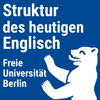2.2 Counting words
2.2.1 Recap: Open and Closed Word Classes
The idea of open and closed word classes is the first we can quantify very easily with the help of corpus data. As opposed to a closed word class, an open word class should have a lot more members. Let’s first recap what types of word classes we know.
- Open word classes
- Nouns: time, book, love, kind
- Verbs: find, try, look, consider
- Adjectives: green, high, nice, considerate
- Adverbs: really, nicely, well
- Closed word classes
- Pronouns: I, you, she, they, mine, …
- Determiners: the, a(n), this, that, some, any, no, …
- Prepositions: to, in, at, behind, after, …
- Conjunctions: and, or, so, that, because, …
- …
- Lexical vs. Function word
- Auxiliary verbs: be, have, (get, keep)
- Lexical verbs: eat, sleep, repeat, …
References
Horsmann, Tobias, Nicolai Erbs & Torsten Zesch. 2015. Fast or accurate? – a comparative evaluation of pos tagging models. In, Proceeding of the second italian conference on computational linguistics, 166–17. Trento, Italy: Accademia University Press.
Schmid, Helmut. 2013. Probabilistic part-of-speech tagging using decision trees. In, New methods in language processing, 154.

